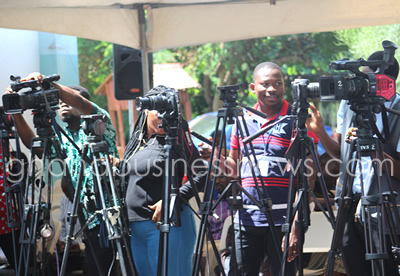Ghana continues poor ranking on global press freedom index
 Ghana has continued its poor ranking on the global press freedom Index released today May 3, 2023 by the Reporters Without Borders (RSF).
Ghana has continued its poor ranking on the global press freedom Index released today May 3, 2023 by the Reporters Without Borders (RSF).
The country drops two spots from 60 in 2022 to 62 among 180 countries listed on the Index.
The country dropped 30 spots from 2021 to rank at 60 in 2022.
According to RSF Ghana is regarded as one of Africa’s most democratic countries, and enjoys a vibrant and pluralist media environment.
“However, the creation of media outlets by politicians has given rise to politicised and biased media content,” it said.
The report notes that there are at the least 100 media outlets, including radio stations, TV channels and websites. It acknowledges that many privately owned media are very popular and reflect a high degree of pluralism and diversity and indicated that these media are independent and not subject to political restrictions.
The report states that there are also community radio stations throughout the country, but points out that, measures taken by the authorities to promote media pluralism have been used by politicians in recent years to create partisan media.
Noting that in Ghana, most media outlets face financial problems, which are reflected in low salaries and poor working conditions for journalists, it said state-owned media, on the other hand, are awarded government advertising contracts and are paid for publishing news items.
The report said “non-transparent and inequitable procedures are used to allocate state advertising.”
The report further states that culture has never been an obstacle to practicing journalism in Ghana.
“There’s a general cultural and religious tolerance in the country, allowing journalists to cover all social issues without any particular difficulty and without the fear of reprisals,” it said.
On the safety of journalists, the report indicates that journalists’ safety has seriously deteriorated in recent years.
“In February 2022, three journalists were detained in the space of eight days and a fourth was very violently attacked. In May 2022, three unidentified individuals stormed into a radio station, smashed equipment and attacked the host and the producer of the show being broadcast. Politicians have meanwhile continued to make death threats against investigative journalists. Most cases of police violence against journalists are not pursued,” it said.
“The World Press Freedom Index shows enormous volatility in situations, with major rises and falls and unprecedented changes, such as Brazil’s 18-place rise and Senegal’s 31-place fall. This instability is the result of increased aggressiveness on the part of the authorities in many countries and growing animosity towards journalists on social media and in the physical world. The volatility is also the consequence of growth in the fake content industry, which produces and distributes disinformation and provides the tools for manufacturing it,” Christophe Deloire, RSF Secretary-General said.
The 2023 Index focuses on the rapid effects that the digital ecosystem’s fake content industry has had on press freedom. It notes that in 118 countries (two-thirds of the 180 countries evaluated by the Index), most of the Index questionnaire’s respondents reported that political actors in their countries were often or systematically involved in massive disinformation or propaganda campaigns.
“The difference is being blurred between true and false, real and artificial, facts and artifices, jeopardising the right to information. The unprecedented ability to tamper with content is being used to undermine those who embody quality journalism and weaken journalism itself,” RSF said.
It states that the remarkable development of artificial intelligence is wreaking further havoc on the media world, which had already been undermined by Web 2.0.
“Meanwhile, Twitter owner Elon Musk is pushing an arbitrary, payment-based approach to information to the extreme, showing that platforms are quicksand for journalism,” it added.
The Index points out that the disinformation industry disseminates manipulative content on a huge scale, as shown by an investigation by the Forbidden Stories consortium, a project co-founded by RSF. And now AI is digesting content and regurgitating it in the form of syntheses that flout the principles of rigour and reliability, it added.
Norway is ranked first for the seventh year running. But – unusually – a non-Nordic country is ranked second, namely Ireland (up 4 places at 2nd), ahead of Denmark (down 1 place at 3rd). The Netherlands (6th) has risen 22 places, recovering the position it had in 2021, before crime reporter Peter R. de Vries was murdered.
According to the Index, disinformation keeps on spreading in sub-Saharan Africa. It said in countries plagued by conflicts and security threats, governments treat the media as propaganda tools.
The Index notes that the military governments of Mali (113th) and Burkina Faso (58th), who aren’t shy about displaying their association with the mercenaries of the privately owned Russian military company Wagner Group, have indefinitely suspended the local branches of two international media outlets and have expelled several foreign journalists.
In the Central African Republic (98th), it said, the content of the Russian propaganda media outlets RT and Sputnik is widely disseminated. The defence and promotion of the pro-Russian narrative has contributed to an explosion of disinformation and the development of a propaganda ecosystem across the continent.
“Fake media networks now even help to denigrate and discredit journalists who do not comply with patriotic injunctions imposed by the new military juntas in power,” it added.
By Emmanuel K. Dogbevi
Copyright ©2023 by NewsBridge Africa
All rights reserved. This article or any portion thereof may not be reproduced or used in any manner whatsoever without the express written permission of the publisher except for the use of brief quotations in reviews.
